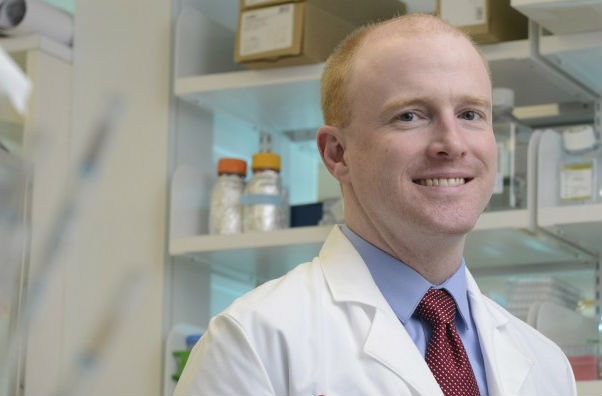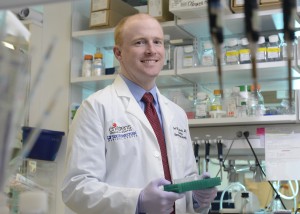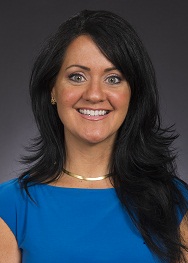 Dr. Ted Laetsch is a researcher at UT Southwestern Medical Center. Photo/Courtesy UT Southwestern
Dr. Ted Laetsch is a researcher at UT Southwestern Medical Center. Photo/Courtesy UT Southwestern
What Doctors Say About Cancer
The Promise Of Immunotherapy
For decades, standard cancer treatments have been surgery, chemotherapy and radiation therapy. In the last few years, though, something called immunotherapy has shown promise – especially for children. The therapy engineers patients’ own immune cells to treat their cancer.
Dr. Ted Laetsch, an assistant professor at UT Southwestern Medical Center, researches novel therapeutics for childhood cancer.
What is immunotherapy?
“Immunotherapy is really trying to turn your body’s immune system against the cancer. So normally one of the functions of the immune system, in addition to fighting infections, is to watch out for cancer development in your body and attack it. We actually think most of us get some pre-cancerous cells very frequently and our immune system takes care of them and we never know about them. But when cancer develops, the cancer has learned how to escape the immune system. So immunotherapy is trying to teach your body back how to have its immune system fight off the cancer.”

Dr. Ted Laetsch is a researcher at UT Southwestern Medical Center. Photo/Courtesy UT Southwestern
Would Immunotherapy replace traditional therapies, like chemotherapy or radiation?
“Right now immunotherapy is for those kids whose cancer don’t respond to standard chemotherapy. It may be in the future we’re able to move this forward and we’re able to replace some of the chemotherapy and reduce some of the side effects.”
What does genetic sequencing have to do with treating cancer?
“The idea behind looking at the genome of a patient’s cancer is that every one of your cells have DNA, but there are mutations in those DNA that cause your cell to become cancerous. So by looking at the specific mutations that are developing in the cancer we can identify what may have caused the cancer and therefore specifically treat that cause, rather than giving chemotherapy that kills every cell indiscriminately.”
Has genetic sequencing helped create treatments for childhood cancer?
“Some childhood leukemias are caused by a mutation of what we call a Philadelphia chromosome. These leukemias [with] the Philadelphia chromosome have an abnormal gene that’s expressed … and that gene causes the cell to grow and become cancerous. We have a drug now that can specifically block that gene, specifically block that mutation. And when we’ve given that to kids with Philadelphia chromosome, we’ve improved their survival from about 10 percent to over 70 percent. So we’ve revolutionized the care of those patients.”
Listen To The Conversation With Dr. Laetsch
Cancer’s Toll On A Kid
Cancer can take a toll on a kid’s physical health, but there are psychological effects, too. Many survivors experience anxiety, while some suffer from post-traumatic stress.
Dr. Shannon Poppito is a psycho-oncologist who works with patients who’ve recovered from cancer at Baylor’s Sammons Cancer Center. Poppito says children often experience cancer differently than adults and teens.
‘There’s this hypervigilance’
“Four- and 5-year-olds are not going to take up cancer the same way as a 7, 8, 9, 10-year-old,” Poppito said. “Because the developmental shifts that are occurring in their bodies, in their brains, are shifting. These little kiddos, they’re just exploring the world for the first time. They’ll understand cancer as not feeling very well and not being happy that they can’t go out to play. … But they look to their parents – if they’re angry, if they’re sad, if they’re nervous. They take on whatever the parents are experiencing of their cancer.”

Dr. Shannon Poppito Photo/Courtesy Baylor Scott & White
“There is something about having cancer that is ever present in your mind, that once you’ve overcome the cancer, you want to make sure you are doing everything in your power,” Poppito said. “So there’s this hypervigilance, this control to make sure that you’re doing everything to take care of yourself. Parents should just be aware of if the fears of contamination start affecting a child’s functioning. Preemptively, perhaps, have a child go see a psychologist … because, as a psycho-oncologist, I see patients that struggled with cancer at 5 years old that will come to me in their 20s having not worked through these fears of contamination and now it has become debilitating, and now they struggle with obsessive-compulsive disorder or they struggle with issues that were left unattended.”
Teenagers and cancer
“Teenagers will experience cancer, maybe some similarities to an 8 or 10-year-old, but different in the fact that stress will trigger a stress hormone called cortisol,” Poppito says. “Cortisol then, working together with estrogen, which females are having course through their bodies as a teenager, will spike this traumatic stress even more. On top of that, we have identity issues. So she’s trying to find her own sense of identity in the world. All of these bio-psycho-social underpinnings will impact how cancer develops this post-traumatic stress in the body, the mind and the spirit of a teenager.”
‘A sense of resiliency’
“What I want to underscore is not only the post-traumatic stress, but also the post-traumatic growth that occurs in patients who have cancer, especially in teen years. They’ve learned a sense of resiliency, a sense of overcoming, their sense of identity becomes stronger. … I don’t think we have enough literature out there on post-traumatic growth — that you can learn something from the cancer you can learn how to make it meaningful and purposeful.”
Listen To The Conversation With Dr. Poppito

